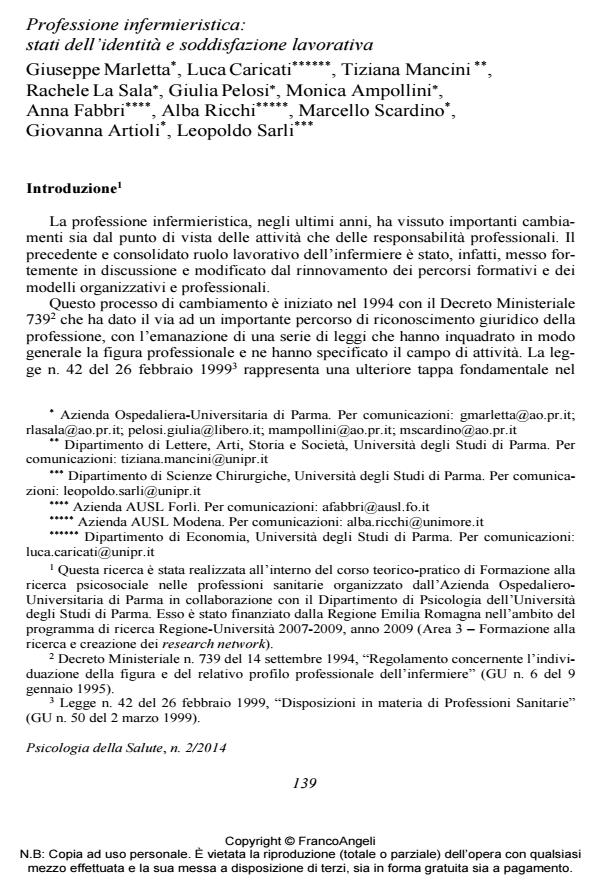Nursing profession: identity’s transitions and job satisfaction
Journal title PSICOLOGIA DELLA SALUTE
Author/s Giuseppe Marletta, Luca Caricati, Tiziana Mancini, Rachele La Sala, Giulia Pelosi, Monica Ampollini, Anna Fabbri, Anna Ricchi, Marcello Scardino, Giovanna Artioli, Leopoldo Sarli
Publishing Year 2014 Issue 2014/2
Language Italian Pages 19 P. 139-157 File size 176 KB
DOI 10.3280/PDS2014-002009
DOI is like a bar code for intellectual property: to have more infomation
click here
Below, you can see the article first page
If you want to buy this article in PDF format, you can do it, following the instructions to buy download credits

FrancoAngeli is member of Publishers International Linking Association, Inc (PILA), a not-for-profit association which run the CrossRef service enabling links to and from online scholarly content.
According to the Marcia’s theory of identity states, this work aims at analyze the processes of definition and transition of professional identity of a group of nurses from Emilia Romagna, studying the connection between professional identity and both organizational variables, such as the perception of regulatory changes, and working motivations and job satisfaction. Through a cross-sectional study, questionnaire was distributed to 838 nurses working in five different public hospitals. The questionnaire measured: 1) professional identity statuses, 2) working motivations, 3) job satisfaction, 4) perception of the importance of the regulatory changes. Results indicate that nurses with identity achievement status have higher job satisfaction, higher motivation and perceive regulatory changes as more important than other nurses. Results suggest that health care organizations should promote educational programs that are oriented to improve, along with professional knowledge and knowhow, also professionals’ awareness about "how to be" nurses.
Keywords: Professional identity, nursing, job satisfaction, motivation.
- The role of group identification, self‐ and collective efficacy on secondary traumatic stress and general health in a sample of emergency medical service volunteers Luca Caricati, Martina De vito, Chiara Panari, in Journal of Applied Social Psychology /2023 pp.373
DOI: 10.1111/jasp.12946 - Attitudes towards Interprofessional Education among Medical and Nursing Students: the Role of Professional Identification and Intergroup Contact Alfonso Sollami, Luca Caricati, Tiziana Mancini, in Current Psychology /2018 pp.905
DOI: 10.1007/s12144-017-9575-y - Group identification and self‐efficacy associated with quality of life in emergency medical services volunteers: A cross‐sectional investigation Luca Caricati, Chiara Panari, Marta Melleri, in Journal of Applied Social Psychology /2020 pp.476
DOI: 10.1111/jasp.12675
Giuseppe Marletta, Luca Caricati, Tiziana Mancini, Rachele La Sala, Giulia Pelosi, Monica Ampollini, Anna Fabbri, Anna Ricchi, Marcello Scardino, Giovanna Artioli, Leopoldo Sarli, Professione infermieristica: stati dell’identità e soddisfazione lavorativa in "PSICOLOGIA DELLA SALUTE" 2/2014, pp 139-157, DOI: 10.3280/PDS2014-002009